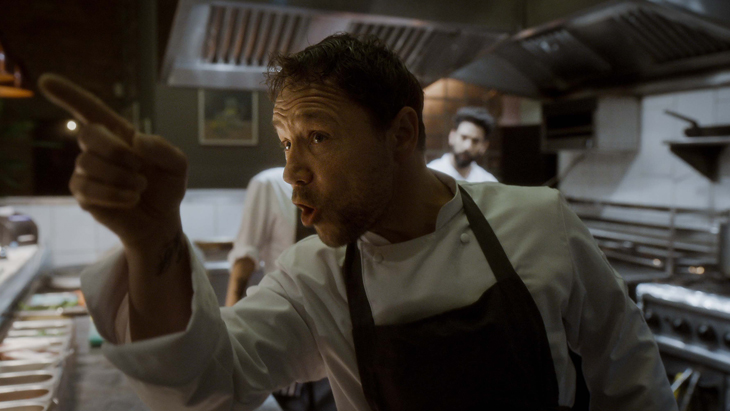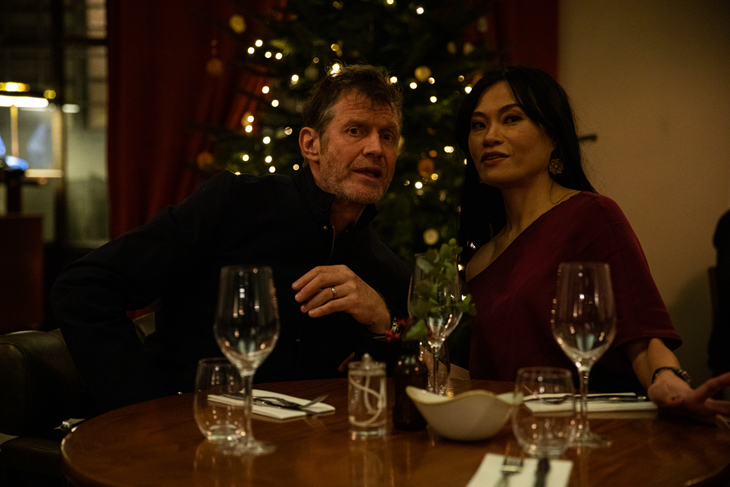From the November 2021 issue of Apollo. Preview and subscribe here.
Cooking takes time. So when people prepare food on screen, they usually serve up an edited version. Television viewers are spared slow cooking; chopping rarely makes the cut. In videos posted on social media, dishes come together from a bird’s-eye view that shows only a cook’s disembodied hands as they whisk and stir and sauté, with the processes set to fast forward. A TikTok crème brûlée zips along like a short by Buster Keaton.
Most cookery programmes, whether they show restaurant kitchens or a staged version of home cooking, set out to make food inviting, not routine. The actual duration of preparing a meal may in some circumstances be soothing but it can also, in professional and domestic contexts, be either cause for stress or a type of drudgery. In the film Jeanne Dielman, 23, quai du commerce, 1080 Bruxelles (1975), Chantal Akerman showed her title character, a widowed mother, cooking dinner for her son: Jeanne Dielman’s meatloaf takes as long as a meatloaf takes, as she folds an egg, breadcrumbs and seasoning into a sticky wodge of mince.
But cooking filmed in real time also brings mild jeopardy, reminding us of the potential for cuts and burns, spillages and breakages, that lurks in any kitchen. That’s certainly the case with Boiling Point (2021), a feature film by Philip Barantini that is shot in one take, and in which the drama unfurls during the course of a busy service in a restaurant in East London. Here are actors playing professional chefs – shucking oysters, wielding knives, working the grill – with no leeway in their performances for any mishap that would force the camera to stop rolling. Even scripted mistakes, such as a sauce ruining on the stove, reiterate just how finely poised between triumph and disaster is the singletake format. It feels appropriate – and it’s a neat joke – that the film opens with a kitchen inspection by a food-safety officer. ‘Always err on the side of caution,’ he says.
Image courtesy Vertigo Releasing

As a work of drama, the film’s achievement is to make its plots credible, while a full restaurant service functions and founders around them. Barantini’s short film of the same title, also shot in one take and released in 2019, focused on the aggressive, intemperate head chef (Stephen Graham) as he struggled to follow his own rule for staff that ‘stuff going on’ – in his case, addiction and his failings as a father – had to be left outside the kitchen. In the feature film, Graham’s character is more vulnerable, still angry but also compulsively apologetic, and with a more nuanced back story: recently split from his partner, in debt to his former employer and desperate to live up to his name above the door. The aspirations and fragilities of other characters are felt more strongly here, too: the sous chef (Vinette Robinson) weighing up professional loyalty against a career opportunity elsewhere; the seemingly self-assured manager (Alice Feetham) who withdraws to a toilet cubicle in tears; the junior pastry chef (Stephen McMillan) who wears his sleeves long, against chef’s orders, to conceal scars caused by self-harm.
But beyond narrative and character, Boiling Point is disquietingly brilliant on the demands of time – and not least because, as a viewer, we know that the clock is always ticking on the continuous take in which the film must reach some form of resolution. (One of the kitchen porters idly watches a football match on his phone while a colleague picks up the slack: another wry reminder that the film must pack all its action into 90 unbroken minutes.) The refrain at the pass is ‘How long?’ – ‘How long on the duck?’, ‘How long on that garnish?’ – and its insistent repetition contributes to a growing sense that time in this restaurant is out of joint. Dialogue swerves between admissions of tardiness (‘We’re running a bit behind’; ‘So sorry about the delay’) and the granting of brief pauses (‘You take five minutes’; ‘Take your time’). Waiters are forced to linger beside tables while diners make their choices. The head chef speaks too quickly for a French employee to understand him. Everything is too fast or too slow – and yet also in real time.
Jason Flemyng and Lourdes Faberes in Boiling Point (2021). Image courtesy Vertigo Releasing

‘Line cooking done well is a beautiful thing to watch,’ wrote Anthony Bourdain in Kitchen Confidential (2000). ‘It’s a high-speed collaboration resembling, at its best, ballet or modern dance.’ Boiling Point attains something of that choreography, at least in the deftness with which its actors, extras and the camera move through the kitchen and dining room, staging an immersive realism that is utterly convincing. That their dance is tumultuous, and that the film’s artifice might at any time crumble, makes for tense viewing. Late in the film, paramedics administer an EpiPen to a diner suffering an allergic reaction. It’s another knowing moment: for the viewer, Boiling Point generates adrenaline aplenty.
From the November 2021 issue of Apollo. Preview and subscribe here.


